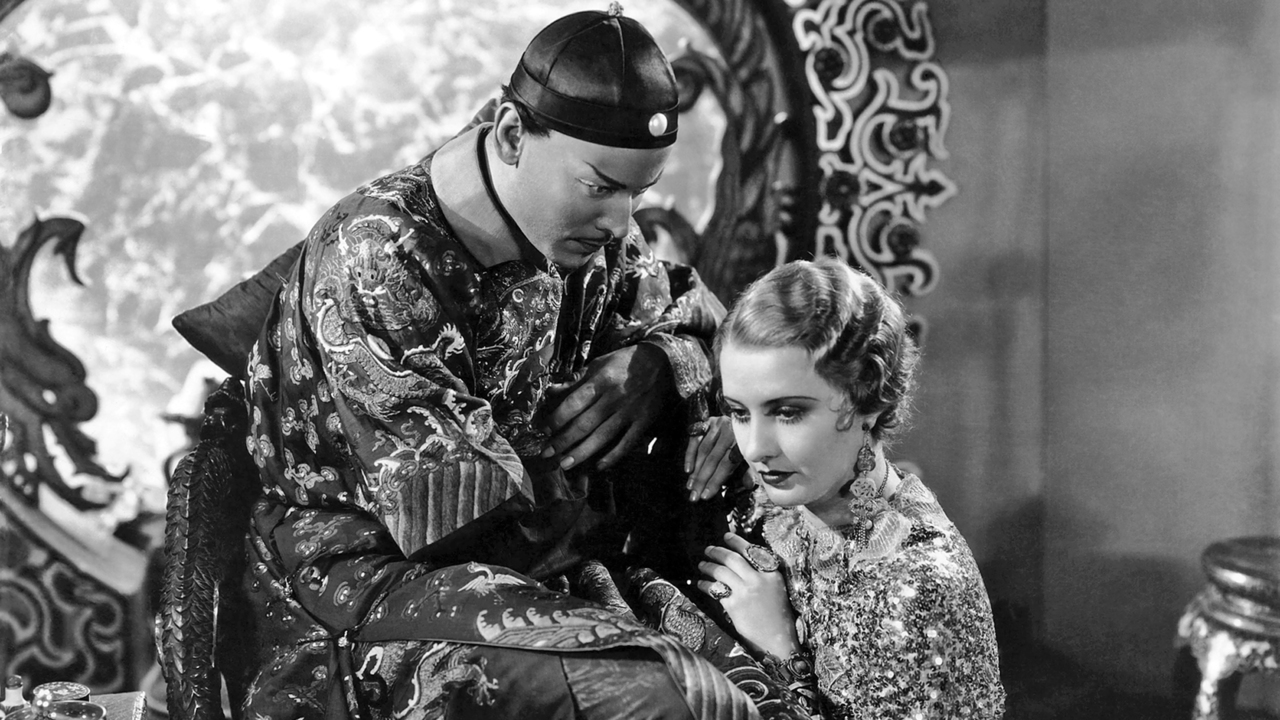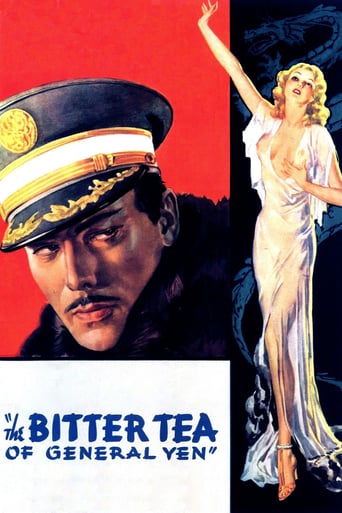



The greatest movie ever made..!
A lot of fun.
Tells a fascinating and unsettling true story, and does so well, without pretending to have all the answers.
View MoreOne of the most extraordinary films you will see this year. Take that as you want.
View MoreBarbara Stanwyck and Nils Asther star in "The Bitter Tea of General Yen," a 1933 film also starring Walter Connelly and Toshia Mori.Stanwyck plays missionary Megan Davis who comes to China during their civil war in order to marry another missionary, Dr. Strike (Gavin Gordon). Before they can be married, they have to save orphans left in an orphanage some distance from Snanghai. While there, the couple get separated, and Megan ends up a guest of a General Yen, whom she had actually met earlier. She also meets his mistress, Mah-Li (Mori), with whom she becomes close. General Yen is attracted to Megan, and she to him -- both attracted and repelled -- and when Mah-Li is accused of selling secrets to the enemy, Megan begs that her life be spared.This is such an unusual film for Frank Capra, and such an unusual film, period. It was banned in England because of miscegenation, even though the main characters are actually played by white people, Nils Asther being Swedish. This is precode, and the Hayes code really clamped down in the U.S. Anna May Wong was problematic casting for The Good Earth and Dragon Seed, and therefore wasn't cast, because she could not appear opposite a white man. Featuring an interracial couple, even if they were playing the same race, likely would mean the movie would be rejected by many theater chains in regions in which anti-Asian prejudice was particularly severe. The new Motion Picture Production Code of 1934, pandering to segregationists, forbade filmmakers from portraying miscegenation in a positive light. Casting a Chinese-American opposite a Caucasian might be construed as promoting miscegenation.The film is very atmospheric, sexually charged, and beautifully acted by the leads. It was particularly a tour de force for Asther, though his career eventually fizzled. Walter Connelly plays a different kind of character, a tough American siding with General Yen.Well worth seeing for its place in history as well as for Stanwyck and Asther.
View MoreFrank Capra, good director as he was, was ruthless in his ambition and self-promotion. He began, rather clumsily, as a showy visual director. He quickly realised however that he would get more kudos by refining and restraining his technique. By 1933, he had gained a substantial reputation and enough weight at Columbia studios to push for his own projects. He decided what he would like next was an Academy Award, and thus plumped for this sweeping love story set in foreign climes, conspicuously lavish and action-filled in the cash-strapped early 30s, especially by the standards of "poverty row" studio Columbia. Surely, he no doubt thought, this would strike Oscar gold.Carpa chose for his star the rising and now very bankable Barbara Stanwyck. Stanwyck's greatest asset it seems was her ability to show great emotion, even fiery rage, without once slipping into hammy hysterics. She is all cool passion, and it is very effective here. Nils Asther, in the title role, is very good too. He is a little theatrical and stylised in his gesture and mannerisms, but like Stanwyck he is calm and restrained, and certainly resists any temptation to turn the Mandarin general into a crude stereotype. And yet he is full of character. There's one great moment, where he stuffs an unwanted cigarette into the mouth of a guard without even looking round, as casually as if the man was an ashtray. Importantly, Stanwyck and Asther have great chemistry, and the performances all round are very fine.Carpa himself is obviously trying hard to load the picture with style and atmosphere, with moody lighting and a roving camera. One of his best techniques seems to have been perfected here, and that is his one of having the camera amidst a group of people like an imaginary extra person on the set. A really excellent example of this is in the first scene where the pastor makes his speech. The camera stays fixed, while a number of other silhouetted figures stop to listen. This has the dual function of making us feel like we are part of this community, and of drawing attention to the man and his words. The shot is punctuated by a neat whip pan into a close-up of a Chinese man's face. There is a feeling however that Capra is trying to turn every moment into a climax, and pretty soon the exquisite shot compositions and endless whip pans start to dull in effect. The dream sequence in particular could have been a little less heavy-handed.All in all, Capra has made a decent little film here. Minimal lighting and a tight editing pattern has cunningly disguised what is actually rather a low budgeted affair. Eerie sound design contributes a lot to the mysterious, oriental feel. But in spite of all the director's best intentions, The Bitter Tea of General Yen was a flop which received exactly zero Oscar nominations. Ironically, while today some may object to Asther performing in yellowface, at the time it was frowned upon for its positive portrayal of interracial love. It is also ironic that, despite all his hopes being pinned on this one, a different Capra movie (Lady for a Day) was nominated for Best Picture and Best Director. Lady for a Day is far less ostentatious, but it is a lot more like the homely heart-warming fare for which Capra would later be known. Was Lady for a Day really better received because it was up Capra's street, so to speak? Or did Capra deliberately re-brand himself in the mould of his first Oscar success?
View MoreBarbara Stanwyck (as Megan Davis) arrives in Shanghai, to marry missionary Gavin Gordon (as Bob Strike). Instead, she falls in love with a sexy Chinese warlord, Nils Asther (as General Yen), who is winds up holding her prisoner. Frank Capra's "The Bitter Tea of General Yen" isn't as offensive as it appears, on the surface; although, the story is, ultimately, unsatisfactory.Still, it's a fine looking production, with beautiful direction and photography (Joseph Walker). Ms. Stanwyck and Mr. Asther perform their sexual attraction marvelously; their characterizations are worthy of "Best Actress" and "Best Actor" consideration. And, supporting actress Toshia Mori (as Mah-Li) makes it a passionate threesome - when the three of them share a scene, on Asther's train, every movement sizzles.******* The Bitter Tea of General Yen (1/6/33) Frank Capra ~ Barbara Stanwyck, Nils Asther, Walter Connolly, Toshia Mori
View MoreFrank Capra made a sort of "little" film in 1933, little in that it starred then up-and-coming Barbara Stanwyck (the future iconic star of Double Indemnity and The Furies had only been in a few films before) and that it dealt with a topic that was very touchy to attempt for in 1933; only Griffith before had tried to deal with some kind of interracial bonding and/or sexual tension between white and Chinese people on screen, at least to my knowledge. What ended up working in favor for Capra with his story, and what makes it still work today still despite the creaky bits of racist dialog (i.e. "China-man" is repeated throughout by the supposedly tolerant missionary Megan Davis), is the script. This has excellent dialog and a potent message about trying to make a difference, to make some sort of change where things are, perhaps in simplification (hey, it's Capra), about the same as they've been for 2,000 years.It's a message that infers some tendencies to prejudices on both sides, of the white well-educated woman who sees to do good wherever she can and the stalwart General who will try to impress and act cordial around the lady but mostly because he wants to have his way- which may be with her. The story itself sounds kind of typical, probably because by today's standards it is: Megan Davis has just come to China to do missionary work but is caught in the midst of a bad civil war going on, and after a tumultuous battle she gets caught up in in the streets and is knocked out is taken into the 'care' of General Yen (Nils Asther, no, not Chinese apparently but does so good a job as to not notice *too* much). She cannot leave his custody at his palace because of the battling blocking up the train tracks, and has to stick tight... in the span of a week she tries to spare a life of a spy and almost falls for Yen, or maybe more than almost.It's actually the one complicated and really exacting thing in this production is seeing Asther and Stanwyck on screen. I'm not sure if the latter gave quite a great performance, but for what she's given she elevates it into a stern-faced but kind-hearted portrayal of a woman caught in an untenable situation, and Asther gives as good as he can by bypassing the obvious pit-fall of stereotyping by making Yen a very human figure. He's a man of class and taste but also tradition and with that typical double-edged sword of being ruthless with slaughter and elegant in decorum and in attitude. Somehow Capra is able to garner very good work from them with a story that, in the wrong hands, could become the most ham-fisted thing on the planet.Luckily not only is Capra uncompromising in dealing with the issues at hand both upfront and underlying in terms of race and ethnicity and just the clashing of cultures, but in technical terms with the bits of battle scenes (the shoot-out late in the film at the train station is breathtaking for 1933 and pretty good for today), and it shows a director so confident in his craft that he could be ready for better things. It might be dated... actually, it is dated. But for any and all faults, it's a picture made with surprising sensitivity and compassion for all its characters, and it doesn't stick to clichés just for the sake of it - it's a solid drama without much pretension, save for a dream sequence that's actually hallucinatory in the best way.
View More